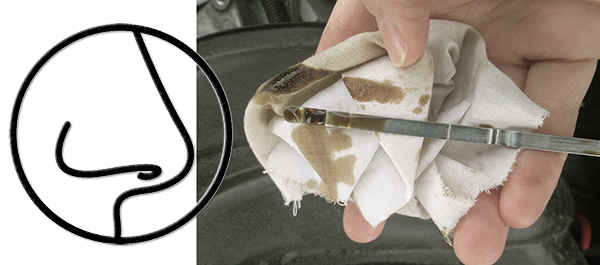Why does my oil smell like gas? Potential Causes
The detection of a gasoline odor emanating from your engine oil is not just a nuisance; it’s a signal of potential issues lurking within your vehicle’s vital systems, impacting both its performance and safety. To safeguard your investment and ensure your vehicle operates at its best, comprehending the underlying reasons for this phenomenon is paramount.
Here’s an in-depth exploration of the potential causes and what steps you can take to rectify the situation.

Potential Causes:
Fuel Injector Problems
Fuel injectors play a pivotal role in precisely delivering fuel into the combustion chamber. However, if these injectors malfunction or become obstructed, they can allow an excessive amount of fuel to seep into the oil pan, resulting in a noticeable gasoline scent within the oil.
Worn Piston Rings
Piston rings act as a barrier between the piston and cylinder wall, effectively sealing the combustion chamber. When these rings degrade or sustain damage, they lose their ability to prevent fuel from infiltrating the crankcase, leading to its mingling with the oil.
Rich Fuel Mixture
An overly rich fuel mixture can impede proper combustion, causing unburned fuel to find its way into the oil supply. This imbalance in the air-to-fuel ratio may stem from various issues, including faulty oxygen sensors, malfunctioning fuel pressure regulators, or a flawed mass airflow sensor.
Engine Misfire
An engine misfire can occur when the air-fuel mixture fails to ignite properly, allowing raw fuel to contaminate the oil. Common culprits behind engine misfires include defective spark plugs, ignition coils, or fuel delivery system malfunctions.
Engine Flooding
Excessive cranking or a malfunctioning fuel system can lead to engine flooding, resulting in an overflow of fuel. In such scenarios, the surplus fuel can breach the piston rings, finding its way into the oil reservoir and imparting a gasoline odor.
What to Do Next?

Diagnose the Issue Thoroughly:
Seek the expertise of a qualified mechanic to conduct a comprehensive diagnostic assessment. Through meticulous testing and inspection, they can pinpoint the precise cause of the gasoline smell in your engine oil, providing you with an accurate prognosis.
Address the Root Cause Promptly:
Upon identifying the underlying issue, heed the advice of your mechanic and proceed with the necessary repairs or component replacements. Whether it entails servicing fuel injectors, replacing worn piston rings, or rectifying sensor malfunctions, addressing the root cause is imperative for restoring optimal engine performance.
Replace the Oil:
Following the resolution of the underlying issue, it’s imperative to drain and replenish the contaminated oil. By doing so, you not only eliminate the gasoline odor but also mitigate the risk of further damage to your engine.
Additional Insights

- Impact of Ethanol-Blended Fuels
In regions like the United States, where ethanol-blended fuels are prevalent, the propensity for fuel dilution issues in engine oil is heightened. Ethanol’s hygroscopic properties make it prone to attracting moisture, hastening the breakdown of oil and exacerbating contamination concerns.
- Performance Ramifications
Contaminated oil not only compromises lubrication efficiency but also accelerates wear on critical engine components, resulting in diminished performance and fuel efficiency. Addressing the gasoline odor promptly is paramount to safeguarding your vehicle’s longevity and preserving its operational prowess.
- Environmental Considerations
Improper disposal of contaminated oil poses environmental hazards, potentially contaminating soil and groundwater if leaked or spilled. Responsible disposal practices are essential to mitigate these ecological risks and uphold environmental stewardship.
By proactively addressing the causes of the gasoline odor in your engine oil and adhering to recommended maintenance protocols, you can optimize your vehicle’s performance, longevity, and environmental impact.
Stay informed, stay proactive, and ensure your vehicle operates at its peak potential.












